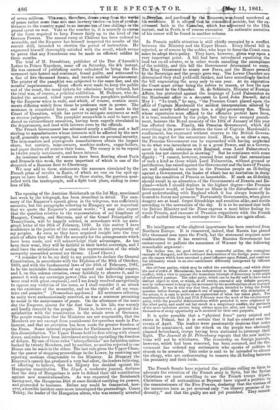"I consider it to be my duty to my peoples
to declare the General Constitution, in accordance with the Diploma of the 20th of October, 1860, and with the fundamental laws of the 26th of February, 1861, to be the inviolable foundation of my united and indivisible empire, and I, on this solemn occasion, swear faithfully to observe it, and to protect it with my sovereign power [this and the following passage were read with great emphasis], and I am firmly resolved energetically to oppose any violation of the same, as I shall consider it an attack on the existence of the monarchy, and on the rights of all my coun- tries and peoples." (Tremendous applause.) All sentences referring to unity were enthusiastically received, as was a sentence promising to assist in the maintenance of peace: On the afternoon of the same day the Emperor, almost for the first time in his life, was warmly and loudly cheered by the people. There is, however, a general dis- satisfaction with the constitution in the minds even of Germans. The people complain that the Ministers are not responsible, that the Members are not exempt from punishment for speeches made in Par- liament, and that no provision has been made for greater freedom of the Press. Some internal regulations for Parliament have increased this dissatisfaction. The Upper House held its first sitting with closed doors, and rake have beep introduced seriously curtailing the,freedom of debate. By one of these rules "interpellations" are forbidden unless backed by twenty Members, and by another, no motion rejected in one House can be made in the other. The last rule gives the Upper Cham- ber the power of stopping proceedings in the Lower, by receiving and rejecting motions disagreeable to the Ministry. In Hungary the Emperor's speech has produced a very bad effect, the leaders believing, or affecting to believe, that his Majesty has decided against the Hungarian constitution. The Lloyd, a moderate journal, declares that the duty of Hungarians is now to defend their old constitution against new constitutionalists. As was expected the Reichsrath having met, the Hungarian Diet at once finished verifying its powers, and proceeded to basiness. Before any could be transacted, how- ever, a horrible incident once more interrupted the proceedings. Count Teleky, the leader of the Hungarian ultras, who was recently arrested
inaresden, and pardontn) y the Emperor, weefound murdered at
his residence. It is all that lie committed suicide, but the ex- eitensent both in the Chatobar, which has adjourned to the 13th instant, and in Pesth is of course excessive. An authentic narrative of his career will be found in another column.






























 Previous page
Previous page